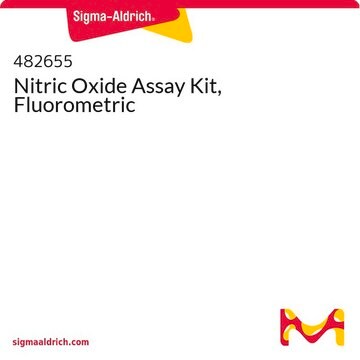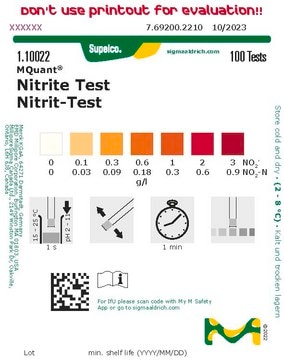MAK367
Nitrite Assay Kit (Griess Reagent)
sufficient for 200 colorimetric tests
Synonym(s):
Nitrite Detection Kit
Sign Into View Organizational & Contract Pricing
All Photos(3)
About This Item
UNSPSC Code:
12161503
NACRES:
NA.84
Recommended Products
usage
sufficient for 200 colorimetric tests
detection method
colorimetric
relevant disease(s)
immunological diseases
storage temp.
2-8°C
General description
Nitrogen-based ions, nitrite and nitrate, are found in almost every living organism. Furthermore, endogenous Nitrite levels are found in mammals and can also be obtained from dietary sources. In humans, nitrite is further metabolized to Nitric Oxide and other reactive nitrogen species (nitrogen oxides). The Nitrate-Nitrite-NO biochemical pathway is well known for its participation in cell signaling, hypoxiadependent response and regulation of blood flow. Recent studies suggest the reduction of Nitrite to Nitrogen Oxygen in the mitochondria. Specifically, myoglobin and xanthine oxidoreductase could generate NO under hypoxic conditions leading to mitochondrial respiration.
Application
- Convenient environmentally friendly on-site quantitative analysis of nitrite and nitrate in seawater based on polymeric test kits and smartphone application.: This research develops an eco-friendly and portable method for nitrite and nitrate analysis in seawater, employing polymeric test kits and a smartphone application for data analysis, facilitated by the Griess reagent for nitrite detection. (Choodum et al., 2020).
- MiR-124 inhibits spinal neuronal apoptosis through binding to GCH1.: The study investigates the role of miR-124 in preventing spinal neuronal apoptosis, utilizing a nitrite assay kit to measure nitric oxide levels as part of the biochemical analysis. (Yuan et al., 2019).
- Humoral factors in ALS patients during disease progression.: This paper examines the changes in humoral factors in ALS patients, measuring nitric oxide levels using a nitrite assay kit to assess inflammation and oxidative stress. (Ehrhart et al., 2015).
- Inducible nitric oxide synthase-nitric oxide plays an important role in acute and severe hypoxic injury to pancreatic beta cells.: The research highlights the significance of nitric oxide in hypoxic injury to pancreatic beta cells, using a nitrite assay kit to quantify nitric oxide levels. (Ko et al., 2008).
Suitability
The kit is suitable for the detection of Nitric Oxide in animal tissues (liver, kidney, etc.), cell culture (adherent or suspension cells), serum, plasma and urine.
Principle
The Nitrite Assay Kit utilizes the Griess Reagent, a classic protocol for the estimation of nitrite. In the assay, nitrite is reduced to Nitrogen Oxide using Griess Reagent I. Then, Nitrogen Oxide reacts with Griess Reagent II forming a stable product that can be detected by its absorbance at A540 nm. The one-step assay is simple, fast and can detect nitrite levels as low as 1 nmol/well.
replaced by
Product No.
Description
Pricing
signalword
Danger
hcodes
Hazard Classifications
Eye Dam. 1 - Met. Corr. 1 - Skin Corr. 1B
Storage Class
8A - Combustible corrosive hazardous materials
flash_point_f
Not applicable
flash_point_c
Not applicable
Certificates of Analysis (COA)
Search for Certificates of Analysis (COA) by entering the products Lot/Batch Number. Lot and Batch Numbers can be found on a product’s label following the words ‘Lot’ or ‘Batch’.
Already Own This Product?
Find documentation for the products that you have recently purchased in the Document Library.
Eloi Franco-Trepat et al.
British journal of pharmacology, 179(2), 270-286 (2021-10-14)
Osteoarthritis, a major cause of disability in developed countries does not have effective treatment. Activation of TLR4 and innate immune response factors contribute to osteoarthritis progressive cartilage degradation. There are no clinically available TLR4 inhibitors. Interestingly, the antidepressant amitriptyline could
Claudia Reyes-Goya et al.
The British journal of nutrition, 1-14 (2022-01-11)
Despite numerous reports on the beneficial effects of olive oil in the cardiovascular context, very little is known about the olive tree's wild counterpart (Olea europaea, L. var. sylvestris), commonly known as acebuche (ACE) in Spain. The aim of this
Our team of scientists has experience in all areas of research including Life Science, Material Science, Chemical Synthesis, Chromatography, Analytical and many others.
Contact Technical Service








